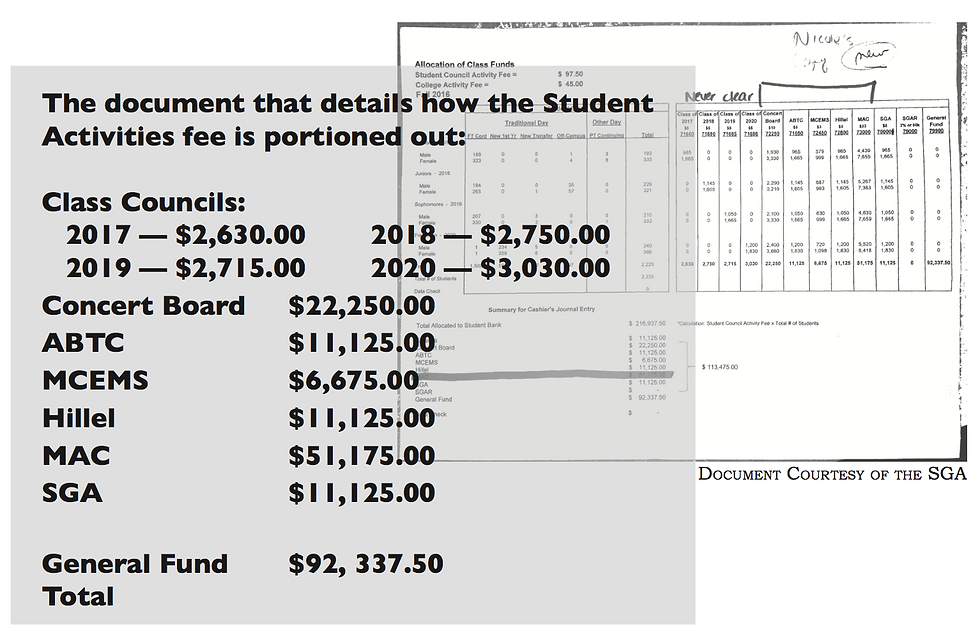On the subject of money: conversation with the SGA Treasurer
- Jack Pennington
- Oct 6, 2016
- 4 min read

I found myself in the Student Government Association office the other day, on a rainy afternoon, across the table from Nicole Case, SGA Treasurer. Noteworthy was rehearsing in the hall outside, and over the course of an hour-long conversation I learned more about the SGA and its funds than I could have ever hoped to get elsewhere. Our talk orbited, touching on a variety of SGA business, but kept returning to one thing: the use and allocation of something called the Student Activities Fund.
What exactly the Student Activities Fund, or SAF, is can be tricky to pin down. In the abstract, Nicole said, it’s easy: a fraction of each student’s tuition is put into a pool of money that funds the groups that have a direct hand in student activities, such as the Class Councils or Hillel. In reality, that pool is never really created, per se. It’s more of a budgeting concept. To calculate precisely how much money goes to each of these institutions, I was told, there’s a publicly available document on the Muhlenberg website: the sacred lexicon of the student treasurer, the Finance Manual.

The SGA just so happens to be the chief organization in directing this money back to the students from which it’s drawn. Nicole was quick to caution that it is a common misconception that the money the SGA provides is somehow ‘SGA money.’ The idea begs the question of how in the world the SGA would get its own income, but, regardless, the SAF is very much student money taken from tuition via a Student Activities Fee. Technically, if you’ve paid your tuition this semester, you’ve put a few fractional cents towards the board games being purchased this Fall by the Muhlenberg Board Game Association or WMUH’s next concert event. Some of the money used to print the paper you’re holding in your hands came directly out of your tuition.
The exact way this funding process works can be tricky. The wide variety of student organizations at Muhlenberg leads to dozens of special cases and budgeting nuances. If the Finance Manual were a perfect document then there wouldn’t need to be anything called a Finance Committee, a group within the SGA.

This semester, the Finance Committee portioned out $108,959.12 to student groups. Unfortunately, this used more than all of the $92,337.50 General Fund, the portion of the SAF that goes towards this budgeting. The extra cost was covered by dipping into a backup account called the SGA Reserve. The total amount budgeted is similar to those the Committee has allocated in past years, though an odd trend has emerged: over recent semesters, the amount of unspent money left over by these budgets has skyrocketed. According to Nicole this isn’t the fault of any particular group or classification of organization, and in many ways is a wonderful problem to have: the SGA simply has too much money.
At the end of a given semester, unspent money from the SAF goes into a Reserve account. This fairly large pool of cash, currently standing somewhere just north of $200,000, is set aside generally for Special Requests, essentially unplanned or emergency funding. Unfortunately, most of that cash is destined to just sit there, and student money that isn’t working for the students is a problem. To that end, the SGA is spearheading several projects to give this extra cash back to the student body.

To put things in perspective, tuition at Muhlenberg is roughly $24,000 a semester. The quantities coming in to the SAF each semester could be covered by roughly ten students out of the twenty-two hundred or so attending this year. Even so, this is still a great deal of money, and I raised the question to Nicole of how the SGA deals with that level of responsibility as a student group. Nicole’s answer was that they are not worried about dealing with the quantities of cash; it is their job, after all. The greater concern for them is one of transparency:
“I agree that information might be available to students, but definitely with hoops to jump through,” Nicole wrote in an email following our discussion, “I think I speak on behalf of everyone in SGA that we would like to change that. Publishing this information and having students be aware of exactly where their student activity fee is going is exactly what we are striving to do.”
In a similar vein is the question of accountability. All the money is on the table, so to speak, but it isn’t difficult to imagine—I supposed to Nicole—a situation where the Finance Committee may be biased towards or against a particular club. The possibility exists, she admitted, though the improvements to the Financial Manual over the past few years have helped immensely against that possibility. In a second follow-up email, Nicole explained, “... there are rules (checks and balances, you could say) in place to prevent such a thing from happening. ...The principle of remaining neutral, no matter the goal of a club/organization, is one that every member of the Finance Committee must uphold in order to remain a member. Just like the US Government, there are rules (checks) in place on Student Government to ensure that one committee is not overreaching their power. After all, it is ‘Student’ Government.”







Comments